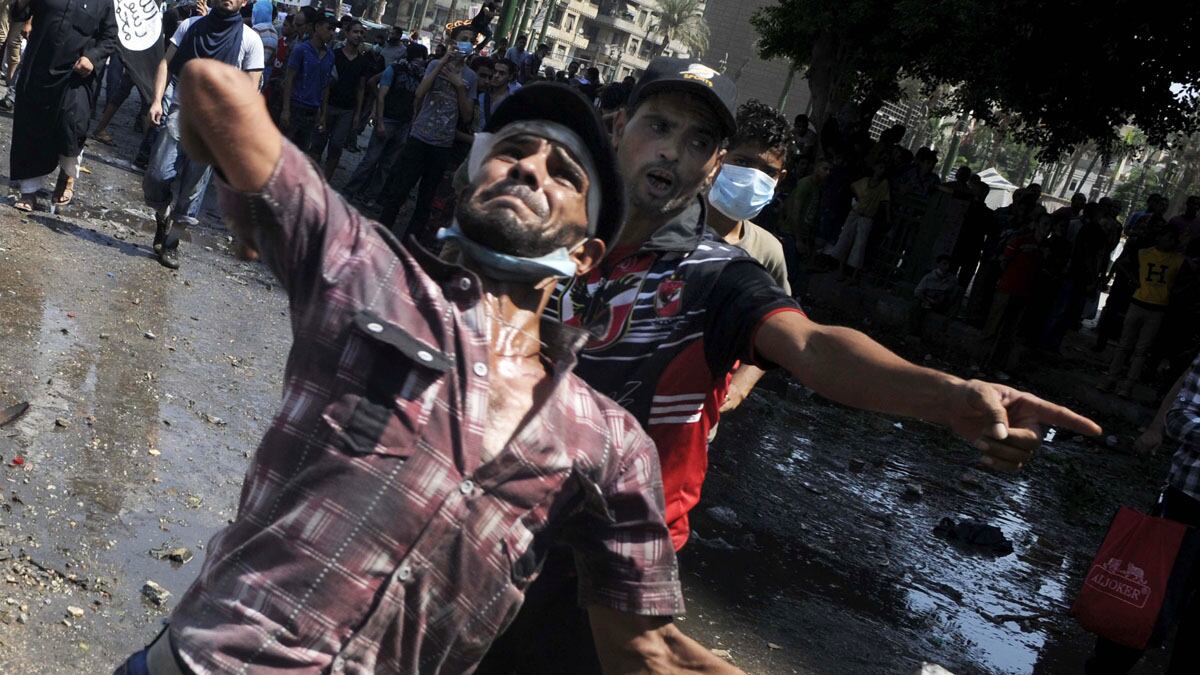Yasir el-Halawany said he came to Friday’s protest in central Cairo to send the world the message that he was standing up for the Prophet Muhammad. There was something else he needed to take care of as well.

A tall and burly 32-year-old with a long black beard, he had been walking in lockstep with other sizable Salafists down the middle of the street leading to the U.S. Embassy that has lately been the scene of violent confrontations between demonstrators and police. The men formed a human bulldozer, forcing back agitators who sought to hurl rocks and bottles at the cops. “There are all these little people causing problems, and we are trying to stop them,” Halawany said.
Tear gas wafted down the street behind him as he moved to a side road for a short break. Occasional shouting matches broke out between the Salafist enforcers and demonstrators who seemed to have come to fight.
Halawany said he was annoyed at what had become of a peaceful, Salafist-led march to the U.S. Embassy on Tuesday against the anti-Islam film that has sparked clashes at U.S. embassies across the Muslim world. That demonstration turned violent—young men scaled the embassy’s walls and replaced the American flag with an Islamic one—and protesters have been battling police on this street ever since.
The people doing the fighting, Halawany said, were hurting his cause. “Some people already had their own problems with the police—old problems, and they came here to solve them,” he said. “That’s why they’re here. But the real people came to speak for the prophet.”
A crowd of Salafists gathered around Halawany as he spoke, and all expressed the same concern—that the violent clashes that have been the focus of international attention on Egypt were sending the wrong message. “We don’t hate Americans. We hate bad people. Our president has a degree from America. He taught in America. His children have American nationality,” Halawany said.
Since protests erupted in Cairo on Tuesday, the country’s Islamist leaders—President Mohamed Morsi of the Muslim Brotherhood’s Freedom and Justice Party, and the politicians of the influential Salafist bloc—have been toeing a difficult line, blasting the film and calling for its creators to be punished while denouncing the violence of demonstrators who say they’re pushing the same cause.
At Friday’s protest, billed by the Brotherhood as a nationwide call to the streets before that call was canceled Friday over concern that things would get out of hand, people like Halawany worried that the violence was leading to a blunt portrayal of what they saw as a nuanced message they had come to send. They doubted that message was likely to come through in Western press accounts, expressing concern that any interviews would be manipulated and cut.
One Salafist man wearing a polo shirt and jeans wanted this point made clear: that his anger at the U.S. government came from his belief that it had consciously allowed the film to be made. “The American government accepted this film to try to show a dark side of Islam on Sept. 11,” he said. “The movie was made with the purpose of making Muslims get angry and do things like attack the American Embassy, so they can say, ‘Look, Muslims are terrorists who kill people.’”
“I think they accepted the film and they knew about it,” he continued. “They know what’s happening. They knew this would harm relations between Muslims and Americans. They don’t care.”
Amr, a 33-year-old sales director from Cairo who declined to give his last name, said that what had been portrayed by some as an apology by the American government wasn’t really an apology at all. (“The U.S. government has absolutely nothing to do with this video,” Secretary of State Hillary Clinton said on Thursday. “To us, to me personally, this video is disgusting and reprehensible…We absolutely reject its content and message.”)
“There are a lot of people who said the U.S. government apologized for what happened—I think it’s wrong,” he said. “About the film, they said: ‘We are sorry, but we have nothing to do with that, because there is freedom of expression in America. So there’s nothing we can do to take action against these people. But we are sorry.’ This is wrong. They are tricking us. They are always tricking us.”
Even if the government did apologize, Amr and the others said, it wouldn’t be enough. The people behind the video should be punished, they said, while new laws should be established to make sure something like this doesn’t happen again. “Every two or three years, they do this in the West,” Amr said, citing the 2005 controversy over cartoons in a Dutch newspaper that portrayed Muhammad.
“They always kill our people and steal our money and say they are sorry. Not just in Egypt, in all Muslim countries. They say they are sorry after they kill our people and our children and rape our women,” Amr said. “We know that the people of America, a lot of them are good. But the American government is not good. They are always against Islam.”






